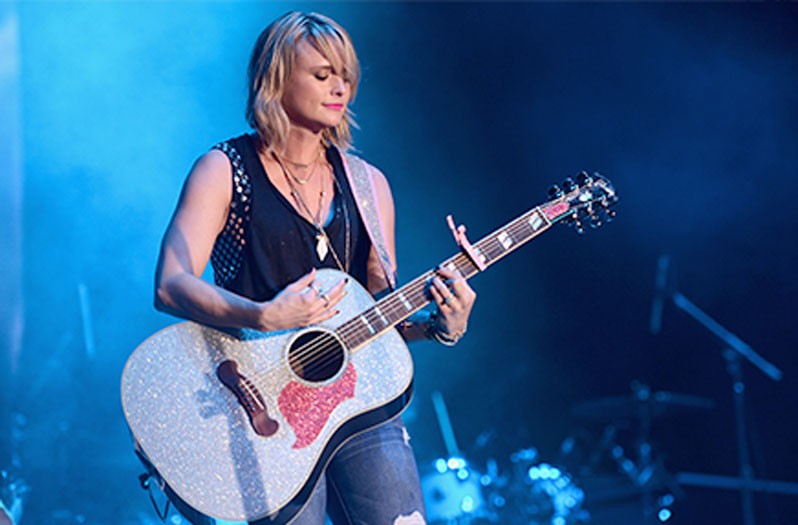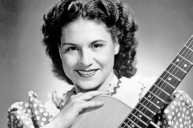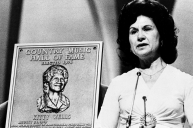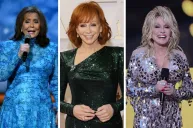When country legend Kitty Wells died in 2012, Loretta Lynn released a written statement expressing how Wells' voice and music shaped her own career.
Videos by Wide Open Country
"If I had never heard of Kitty Wells, I don't think I would have been a singer myself," she wrote.
It's downright impossible to imagine country music without Loretta Lynn. But before Lynn was a three-time Grammy winner who changed the course of country music, she was a young woman listening to the radio.
It's important to remember Wells' influence on Lynn and countless other female artists today when women in country music are routinely told that when it comes to country fans, particularly female country fans, women artists aren't in demand.
Kelleigh Bannen, a singer and host of the podcast This Nashville Life, took to Twitter recently to express her frustration over being told, once again, that "women don't want to listen to other women" on country radio.
Also was told ?the numbers still say women don?t want to listen to other women? in a meeting on Wed. People have been saying this to me for 8 years. I practically have my doctorate in people saying this to me. But sorry?still a woman, still over here trying to make music. ??
— Kelleigh Bannen (@kelleighbannen) January 12, 2018
"The numbers still say that women don't want to listen to other women."
This blanket statement offered as fact wasn't true in 1952 when Kitty Wells recorded "It Wasn't God Who Made Honky Tonk Angels." It wasn't true in 1975 when Loretta Lynn released "The Pill." And it's not true now. But that hasn't stopped it from getting repeated in meetings like the one Bannen mentioned.
In response, Martina McBride and singer and Nashville hit-maker Matraca Berg tweeted the hashtag #womenwanttohearwomen, sharing their own experiences trying to get their own music and music by fellow women artists heard. The comments on Bannen's tweet reflect the lunacy of the statement. Not only do women want to hear female country artists, they are actively seeking them out.
The gender imbalance on country radio has been a hot topic of discussion. That's because it's one of the most disconcerting trends in country music today. And it shows very few signs of slowing down.
In 2014, a group of music industry leaders started Change the Conversation, a collective formed to get more women artists on country radio and dispel the myths that have lead to a downturn in female representation in country. The group is open for attendance and meets once a month.
In a 2015 meeting, political economist, Stanford Ph.D. candidate and avid country music fan Deverati Ghosh presented an in-depth look at country radio's gender imbalance using the Billboard Country Airplay chart. Ghosh found that between 2008 and 2015, major labels introduced 31 women and 51 men to country radio. Of those women, just 32 percent scored a top 20 single. Out of the men, 57 percent of the new artists scored a top 20 hit.
Compare that data to the period between 1992 and 1999, when major labels introduced 41 female artists and 67 male artists to radio. Out of those new artists, 44 percent of female artists and 42 percent of male artists charted a top 20 single.
What's the cause of disparity? Ghosh reported that in that 2015 meeting, Matraca Berg said that female songwriters were being pushed to write for male acts, resulting in fewer songs geared toward female listeners and more of those hyper-masculine girl-in-a-truck songs. Even as bro-country continues to decline in popularity, the formula remains the same.
Another factor is that singles by female artists aren't given the same chance to chart as those by male artists. Ghosh's report noted that new male artists are given the benefit of the doubt and given more time to build an audience for a song. Not every single will be a hit right out of the gate. Ghosh noted that Little Big Town's "Girl Crush" stalled just outside of the top 30 on the country charts before gaining momentum and hitting No. 1 on the Billboard Hot Country Songs chart. During the time it was stalled, "Girl Crush" was sustained by female listeners who had an overwhelmingly positive response to the song.
So what about the notion that women actually prefer songs by male artists? The data is based on Portable People Meters (PPMs), a system developed by Arbitron (now known as Nielsen), to measure how many people are exposed to or listening to individual stations. The meters replaced the previously-used diary system, in which people simply recorded what they listened to throughout a given period of time.
Portable People Meters track inaudible codes in each individual radio station to track what each person is listening to or exposed to. Using PPMs, Nielsen can track when people "tune in" or tune out a song. The problem? Critics of PPMs have blasted the method, noting technical issues in detecting station codes, sample bias and the fact that some people weren't even made aware that the PPMs were for tracking radio. Programmers are making decisions based on data that's just not verifiable.
Country radio is not building a foundation for country music to grow. If women don't hear themselves reflected on country radio, there may be less and less women creating country music. Something has to change. The future of country music may depend on it.




